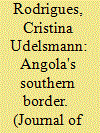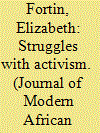|
|
|
Sort Order |
|
|
|
Items / Page
|
|
|
|
|
|
|
| Srl | Item |
| 1 |
ID:
099370


|
|
|
|
|
| Publication |
2010.
|
| Summary/Abstract |
Santa Clara, on Angola's southern border with Namibia, is now a very dynamic urban hub, both economically and socially. It stands out in the remote province of Cunene, recording greater growth in the last five years than the provincial capital, Ondjiva. Its recent transformation into a thriving trading centre was mostly due to massive migration and an intensification of trade between Angola and Namibia at the beginning of this century, although the region's history in the last hundred years is a very different one. While local traders and entrepreneurs have developed their own strategies within this context, national and local administrative structures of the recently pacified country are trying to regulate trading and settlement. These forces in action produce both more sustainable and organised urban growth and at the same time influence social and economic development in the region. The main boom seems to be over, due to relatively successful regulation, which makes the region less attractive to business activity. Traders and entrepreneurs operating locally now have to find new strategies and opportunities. This article, based on empirical research and combined surveys, conducts an analysis of these dynamics and contributes to an understanding of regulation impacts, the way in which local traders cope with them, and the strategies they have developed.
|
|
|
|
|
|
|
|
|
|
|
|
|
|
|
|
| 2 |
ID:
099371


|
|
|
|
|
| Publication |
2010.
|
| Summary/Abstract |
Associations have been labelled the main 'building blocks' for creating social capital. It has been argued that community associations need to transform 'bonding' into 'bridging' ties to 'reach out' while also creating 'linking' ties to 'scale up'. External development actions follow a reverse logic in promoting these associations: they assume that linking ties with the external intervener will reinforce prior social capital endowments. This article highlights the inherent difficulties of such a 'social engineering' approach in the context of post-conflict reconstruction, describing three development interventions in the north of Burundi. It defines the process of 'institutional syncretism' - merging local with global institutional settings - as a key element to social capital building. The findings illustrate how the three interventions failed to reach this objective, and question 'bridging' associations as 'universal blueprints' for restoring social cohesion within the liberal peace model for post-conflict reconstruction.
|
|
|
|
|
|
|
|
|
|
|
|
|
|
|
|
| 3 |
ID:
099366


|
|
|
|
|
| Publication |
2010.
|
| Summary/Abstract |
A series of murders of albinos in Tanzania's north-west mining frontier has been shrouded in a discourse of primitivism by the international and national press, sidestepping the significance of the contextual circumstances of an artisanal mining boom firmly embedded in a global commodity chain and local profit maximisation. The murders are connected to gold and diamond miners' efforts to secure lucky charms for finding minerals and protection against danger while mining. Through the concept of fetish creation, this article interrogates the agency of those involved in the murders: the miners who purchase the albino charms, the waganga healers renowned for their healing, divination and sorcery skills who prescribe and sell the charms, and the albino murder victims. The agrarian background, miners' ambitions and a clash of values comprise our starting point for understanding the victimisation of albinos.
|
|
|
|
|
|
|
|
|
|
|
|
|
|
|
|
| 4 |
ID:
099368


|
|
|
|
|
| Publication |
2010.
|
| Summary/Abstract |
Political violence in sub-Saharan Africa is down. The number of military dictatorships and one-party states is also down. Are the two trends related? Conventional democratic peace theory says the answer is yes, because the relationship between democracy and peace is linear and positive. A revisionist view, however, raises questions. The majority of Africa's new regimes are not full democracies but mixed regimes that some studies find to have the greatest propensity to violent behaviour. Using statistical analysis of a trichotomous classification of African regimes from 1960 to 2008, this article suggests that neither argument fits the facts. Autocracies and partial democracies in this region appear to have similar exposure to conflict, with both types of systems suffering more conflict than full democracies. Variables other than regime type appear to be the driving forces behind these trends.
|
|
|
|
|
|
|
|
|
|
|
|
|
|
|
|
| 5 |
ID:
099369


|
|
|
|
|
| Publication |
2010.
|
| Summary/Abstract |
Most of the reports about the reaction of the Ethiopian regime to the blow that it suffered in the 2005 elections focus on its institutional evolution, and conclude that it took a turn towards even stronger authoritarianism. Observations made in a rural community in south-east Amhara State reveal that it reacted first, until the end of 2009, by a whole range of the deepest reforms since its takeover in 1991. These combined a stronger grip of the ruling party in all areas with a 'liberalisation' of the rural development strategy and first steps towards local 'good governance'. They were embodied in the rise of the traditional rural elite which had been ostracised for years, as if the regime was trying to build its new constituency on it. But at the end of 2009 the local authorities suddenly returned to the all-encompassing authoritarian attitude characteristic of the pre-2005 period. This 'liberalisation' could thus be seen as merely a tactical interlude, conceded by a ruling party still driven by its Leninist legacy and the Abyssinian 'culture of power'.
|
|
|
|
|
|
|
|
|
|
|
|
|
|
|
|
| 6 |
ID:
099367


|
|
|
|
|
| Publication |
2010.
|
| Summary/Abstract |
In 2004, a long-awaited piece of post-apartheid legislation, the Communal Land Rights Act - to reform the land tenure of those living in the former 'homelands' of South Africa - was passed into law unanimously by parliament. This unanimity, however, conceals the extent to which the process towards this moment was deeply contested. Exploring the efforts by land sector NGOs to secure legitimacy in their engagements with this process reveals the extent to which wider power relations and contestations have determined their positioning. Those within the non-governmental land sector who opposed the legislation pitted themselves against African National Congress politicians and high-profile traditional leaders. However, the adoption of a Mamdani-inspired discourse to contest such politics and oppose the proposed legislation contributed to reinscribing narrow readings of knowledge considered to be legitimate. Their engagements were also shaped by changes in the NGO sector. Reduced funding for land sector NGOs and an increasingly ambivalent relationship between them and government contributed to contestations between NGOs and among people working within them. Their strategic engagements in such wider and internal politics influenced both the frames within which such policy change could be debated and the ways in which individuals working for NGOs consequently positioned themselves in relation to their constituents.
|
|
|
|
|
|
|
|
|
|
|
|
|
|
|
|
|
|
|
|
|